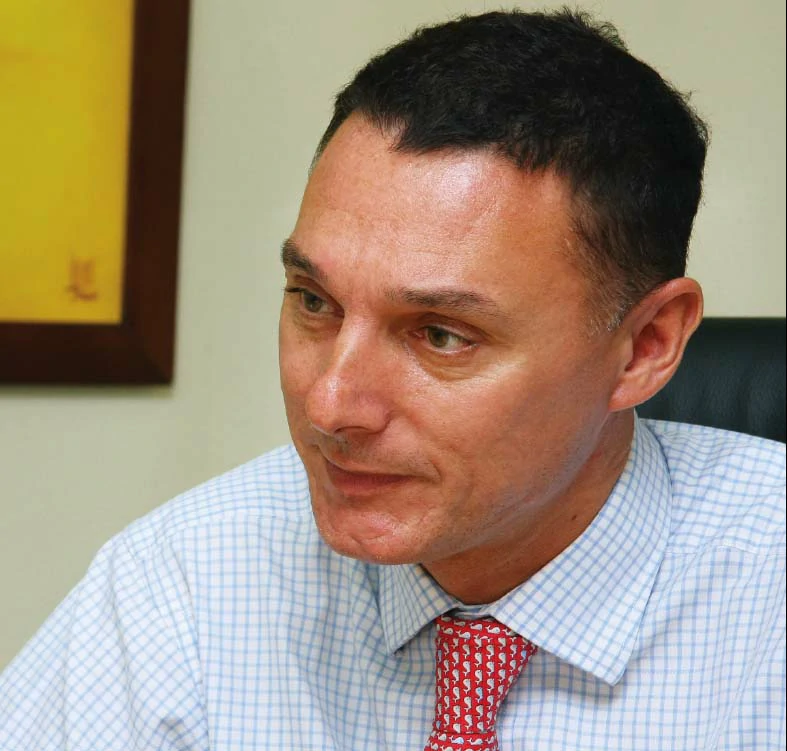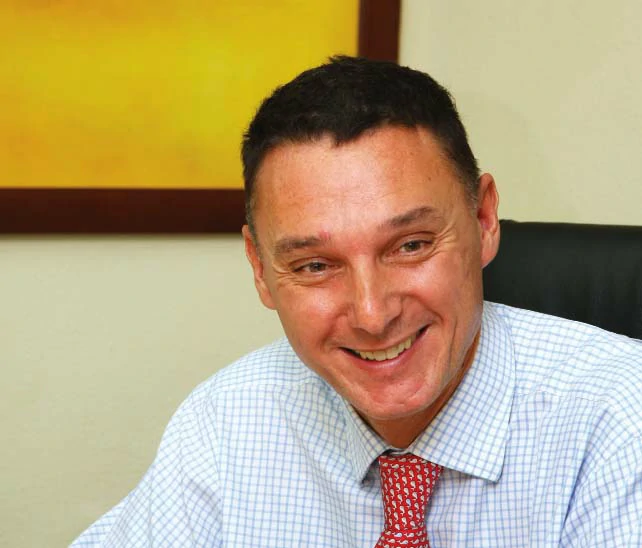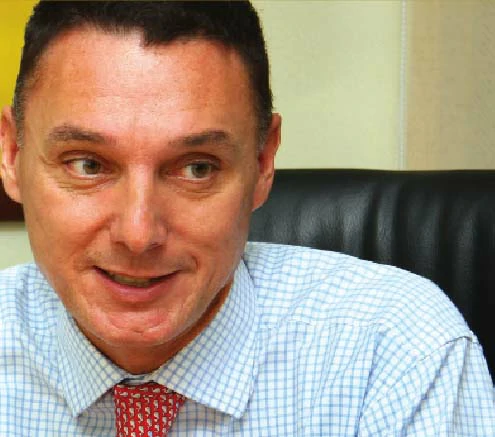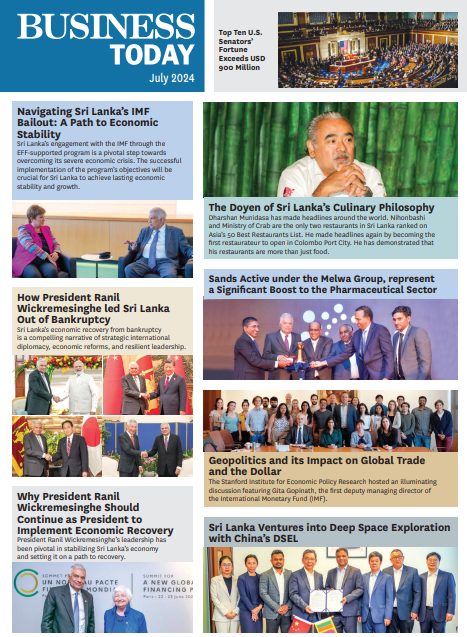
In July 2007, Simon Machell was appointed the Chief Executive, AVIVA Asia Pacific. He has been working with the insurance giant for 14 years and after a successful year and a half in the Asia Pacific region, Simon speaks with Thilini Kahandawaarachchi
about his time with AVIVA and their plans for the region, in particular for Sri Lanka in the next few years.
You have been with AVIVA for 14 years, what have your years with AVIVA been like? For you, what were the highlights?
I started my career as an accountant and was trained at Ernst & Young and then went into the insurance industry and joined Legal and General, UK. After a short stint there, I joined AVIVA UK (then Norwich Union) in 1994 in a financial role. After a few years I was given the option to go into General Management, which was a fantastic opportunity. It was outside my comfort zone and involved claims management about which I had no prior experience. I went from running about 40 people to managing 1500 people.
When I reflect back, I feel it was great of the organization to give me that opportunity and to have confidence in me to do something different. That happened at a number of points in my career and as new opportunities came my way I went along and did different things.
I was involved in claims management for a while and when we bought another company my role was expanded and I had to look after all of the operations for Norwich Union, soon I was doing all the servicing and all the customer service as well. It was also a matter of being in the right place at the right time, so as the company grew, I was given opportunities to do more things. Then when we bought RAC, I lead the team that was involved in the acquisition and was then asked to be the CEO of that business. Since I absolutely love cars and motoring, it was almost like a dream come true to be paid to do something that I actually love doing. I spent close to a very happy year or so doing that. Then I was appointed the CEO of Norwich Union, UK and in 2007, when the new executive committee was named, I was appointed to run the business in the Asia Pacific region.
I was involved in setting up our off shoring business in India and Sri Lanka and I’ve been here more than ten times or so, but I’ve never actually worked abroad. So it’s a fantastic opportunity to work in a different part of the world; a growing, vibrant, expanding part of the world. My 18 months here have been very exciting.
What are the management principles that you follow? As the Chief Executive for Asia Pacific region how adaptable were your management principles in this region?
My main principle is, you have to find the best people to do the job and then put your faith, confidence and trust in them and give them all the support you can. Then people will generally do a very good job for you. That works whatever country or whatever market you are in. I believe that business is successful if you have the right people doing the right jobs, people who are motivated and people who want to come to work. You should encourage them to make things happen. All businesses whatever they are, are people things, you need technical expertise in business, but mostly you need people to get on with other people and that’s what gets things done.
I love people who make decisions and move things forward. I think we are all paid to come to work and to make decisions effectively. One of the biggest crimes in business is people who do not make decisions. So, I’d rather somebody who made a decision and got it wrong and learnt from that, to someone who did not make a decision at all. I like pace and speed and I like things to be moving forward. If you can get the right people working around you or working in the businesses in which you are operating, then you’ve got much greater success.
All Businesses Whatever They Are, Are People Things, You Need Technical Expertise In Business, But Mostly You Need People To Get On With Other People And That’s What Gets Things Done.
You have worked in the UK and in Asia Pacific. What do you think about the work ethic in this region? Is it the same everywhere or is there a notable difference in attitude to work here?
It is difficult to look at the whole of the Asia Pacific region and say it is all the same. I don’t think it is the same and you do have people with different approaches in different countries.
There are differences in terms of how much people are prepared to say to you as a boss. In some places people are very much more respectful of the boss and they would never give the boss any bad news. That would tend to happen a bit more here and in India, so giving bad news upwards is sometimes more challenging, but I think that is partly cultural. The job of any leader is to make sure people can give you all the information that you need to do your job, whether it’s good or bad. The worst thing you can do as a manager or as a leader is to shoot the messenger or somebody that gives you information. You need a manager to create an environment where people feel comfortable in terms of giving you that information.
Whatever culture you work in, you should create an environment where you can have an honest dialogue with people so that you can actually get all the information about what’s happening in the business and what needs to be done.
People in Asia tend to be more ambitious than people in the UK. When I go around and speak to people here and in a number of other countries, one of the things that I often get asked is “when can I have your job?” That’s a rare question in the UK. I love ambition and I love people who want to come to work, to succeed and do different things. So whenever someone asks me, “how did you get to where you’ve got to?” or “how can I get your job?”, that’s fantastic. Somebody’s thinking about where they want to go next.
Work ethic in places like Sri Lanka is very high. People work incredibly hard. They come to work to do a good job and they would be here as long as they need to. I think sometimes people work too long and spend too many hours in the office.
As an ardent fan of motor sports and also as someone who has to travel constantly, what is your personal philosophy on work life balance?
Lots of people talk about work life balance and a lot is said about it. I believe in having a work life and home life. What I’ve noticed in a number of Asian countries is that the balance is not as good as it is in some of other countries such as the UK. But in the UK sometimes it can go too far on to the other side.
We all need to find a balance between how much time we spend doing work and how much time we spend outside of work. A person who works all the time ends up being quite tired and jaded and actually finds it difficult to do a good job. It’s all about having a balance. You can do things outside of work that you find interesting. Then you come to work refreshed and keen to do a good job.
However, it is different for different people. If you can do a great job in 6 or 7 hours then that’s fantastic. Not everybody wants to progress to the next level of the organization, some people just want to do what they are doing and enjoy it and have other interests in their lives. The challenge for an organization is to have a setting where you can offer people the ability to flourish at work and also give them the opportunity to flourish outside as well.
What can you say about AVIVA’s talent management philosophy? How do you put it into practice in this region to both attract and retain talent?
Talent management is one of the critical objectives that we have as a business and one of my jobs is to make sure that I have the right people working around me. But more importantly, we need to create the right environment in all of our businesses in the region so that we can attract the best people. Retaining them within the business comes down to the brand we have and the promise we make to the employee. So when you come to work, you make a commitment to the organization by putting your time and effort, your heart and soul into your job. The organization has to make a commitment back to you and provide you the opportunities to progress your career, to do things that you find fulfilling and to enjoy your life at work.
To me it is about the employer and the employee having a good conversation about what your expectations are from me as an employer and what my expectations are from you as someone working for me. So talent management is about managing your career and managing what you are going to do at work. That comes through having a good conversation.
The traditional way of doing things is the employer doing an appraisal once a year and saying that you’ve done a good job, an ok job, or that you’ve done a bad job. The dialogue tended to be one way. I think the right approach to managing talent is to have a two way conversation where the employer talks to you about what your talents are and how that fits in with the organization and for you to say, this is what I want to do with my career and it may well be to find a way of fitting the two together. Maybe everything’s fine, you are in the right job, doing the right thing, it may be that the employer needs to find you a different role or that your talents are better suited working in a different organization. You need to have that sort of two-way conversation to find out what works best. Talent management is about having honest and open conversations. It’s not about picking few very talented people; everybody is the talent of the organization.
The Worst Thing You Can Do As A Manager Or As A Leader Is To Shoot The Messenger Or Somebody That Gives You Information. As A Manager You Need To Create An Environment Where People Feel Comfortable In Terms Of Giving You Information.
When you look at AVIVA’s global business strategy, what is the importance of Asia to AVIVA?
Except for our business in Australia, which is over a 100 years old, in Asia Pacific AVIVA is a relatively new story. Most of our other businesses were started around 2000 or 2001. Though we’ve been in and out of Asia, we are relatively young in Asia. If you look at our Asia Pacific business today we are operating in nine countries around Asia, all of which were started relatively recently. We are about 10% of the Group in terms of the premiums and that’s grown year on year.
I think if you look at the speed at which the Asian markets are growing, particularly China and India, those markets will become much bigger markets going forward.
If you look at China you’ve got 23% to 24% of the population and 18% people in India. So you have got two and a half billion people between those two markets. The speed of development of those economies means that they are the sort of people who are going to be buying the products that we sell. They are going to be saving for the future, their retirement, their children’s education and the markets represent huge opportunities for us. We are still relatively small in those markets but the simple demographics of the markets mean that those markets are going forward.
So if you ask somebody sitting in this seat in 20 years time, I think you will find the number of Asian markets represent a bigger proportion of AVIVA’s overall business simply by the fact that the markets have grown bigger and they continue to grow.
The nine markets that we have in this region can be categorised into three groups as mature markets, huge economies and markets where we have recently made an entry.
The mature markets are Australia, Hong Kong and Singapore. These are established and they have been around for a long time. Though we still get some growth, there isn’t a huge growth of population, so the role we have is to continue to compete in those markets. They will give us a big chunk of our profits in the near future because they’ve been around and they are more mature.
On the other hand India and China are huge economies that are driven by the number of people and the markets continue to grow rapidly which will contribute to a much bigger proportion of our business. China grew by 74% in the first three quarters of this year while in India we saw a 35% growth.
The third category is markets where we’ve recently made an entry – that is South Korea, Malaysia, Taiwan and Sri Lanka. In the first three countries we entered a joint venture with a bank and started our business from scratch. As you know, in Sri Lanka, we have a joint venture with NDB, which is an established business. All these markets have a lot of growth potential and we have to take advantage of that potential.
What do you think is the impact of the present global economic crisis on Asia? What are the major challenges that we face as a region?
Three or four months ago, people were talking about Asia decoupling from the rest of the world and Asia continuing to grow while the rest of the world had more of an economic problem. But Asia is intrinsically linked with the rest of the world’s economy. So challenges in one part of the world are bound to have a knock on effect on others. Many Asian countries are exporters and the demand for their products or services would fall, but it is relative. What you’ve actually got is a number of western countries in real recession; the size of their economy is actually shrinking but what you see in Asia is the growth rates coming down from very high levels. The 10% plus growth rate in China may come down to 7% to 8 %. But they are growing pretty rapidly, though not to the same extent as before. However, we’ll still see growth in Asian countries.
The impact for us would be that a number of products that we sell are equity related investment products. The appetite of customers to buy equity related products has gone down a lot, people who’ve invested last year have lost some of their money and they are cautious about investing and going forward. People are looking for more fixed interest products and more products with guarantees etc. There is a change in customers’ behaviour towards safer type of businesses and that will continue. We have seen a shift in the buying of products and there is a move away from investor type of products. AVIVA has a whole range of products for people who want to invest in more risky products or for people who want to invest in safer products.
At AVIVA we want to conserve our capital by managing our assets and balance sheet through this difficult period, so our shareholders will look to us to conserve capital and not to spend it on things in the short term. But, in the long term there may be opportunities in Asia and the rest of the world, but I think the name of the game for the moment is conserving.
We Create The Right Environment In All Of Our Businesses In The Region So That We Can Attract The Best People. Retaining Them Within The Business Comes Down To The Brand We Have And The Promise We Make To The Employee.
In your opinion, are there opportunities for Asia in this economic crisis?
There are opportunities for Asia. Asian markets are growing and to some extent they might get ahead of some of the western countries that are not growing. Asia may have opportunities to buy in the rest of the world, some of the businesses have been investing overseas but there are challenges with that. I would not see lots of acquisitions happening. The world for acquisitions is going to be difficult and prices of assets are not likely to come down. People are going to be cautious about investing capital in their businesses.
After holding your post as the Chief Executive- Asia Pacific region, for about 18 months , what can you say about AVIVA’s strategy for the region, and in particular for Sri Lanka?
Our strategy for the region has been one of growth. We’ve set ourselves a growth target of 20% per annum for the future. We had a great year in 2007 during which we grew by about 65% or so. This year up to the third quarter we grew by about 13%. Next year we are probably going to grow a bit, but not as much as in 2007. However, in the long term, an average of 20% looks sustainable. Some years are good; some years are not so good.
Some of the growth will be driven by economies themselves growing and in particular the savings and investment sectors growing. So when we look at how much people are spending in terms of insurance related products, it is pretty low in most of the places in which we offer it. Simple dynamics is that over time people will put more money into savings and investment that will give us opportunities. The growth rates for us are achievable in the medium term; we won’t achieve 20% every year simply because of the ups and downs of the economy, but in the long term that looks very achievable.
It is the same picture for Sri Lanka as well. The economy is going to do all right in the future though it had some ups and downs this year. It had inflation and it had some challenges in terms of maintaining the growth rate, but it is still pretty good by international standards.
The opportunity for us is about designing the right type of products for people to buy and in understanding what customers want and need. You’ll be a winner in any market if you understand what people need. Insurance is not a product that is exciting, but it is a product that is important in terms of protecting your future or providing for your loved ones. We’ve done pretty well in Sri Lanka with Eagle as it understands the needs of our customers.
The opportunity to prosper is promising and the future here is good for us. We are in a reachable position in terms of our market share etc. and I hope that we would improve that going forward.








